
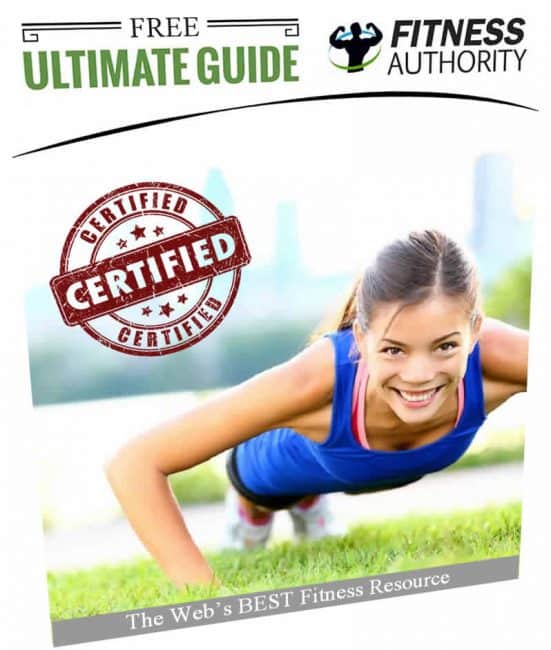
FREE E-book worth £19.95
Free for our readers!!!
Enter email to have it sent directly
We will not use the email for spam
Enter Email To Download
[mautic type="form" id="4"]
Top 20 Foods To Boost Your Weight Loss
Losing weight generally involves a combination of increasing your activity levels and adjusting your diet. Understanding how to eat well and healthily is often a key part of losing weight and then maintaining a healthy weight over the long term. With this in mind, we’ve compiled a list of 20 foods which can help with your weight loss and some of them may surprise you.
Carbohydrates and fibre
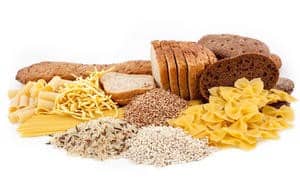 Please ignore any diet gurus who suggest cutting carbohydrates from your diet in order to lose weight (or for any other reason). Carbohydrates are an important food group and for the most part you want them to be complex carbohydrates, these provide slow-release energy to keep you moving (literally) from meal to meal. Fibre helps to make you feel full and also keeps your digestive system in order. Soluble fibre is particularly good as it helps slow down the digestive system so you feel fuller for longer.
Please ignore any diet gurus who suggest cutting carbohydrates from your diet in order to lose weight (or for any other reason). Carbohydrates are an important food group and for the most part you want them to be complex carbohydrates, these provide slow-release energy to keep you moving (literally) from meal to meal. Fibre helps to make you feel full and also keeps your digestive system in order. Soluble fibre is particularly good as it helps slow down the digestive system so you feel fuller for longer.
Potatoes
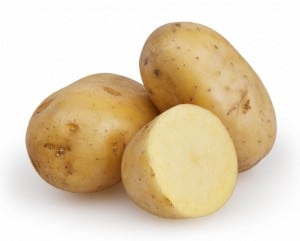 We’ll bet there are a few people surprised to see the humble potato top our list of foods to boost weight loss. The potato itself is actually a really healthy food, particularly if you keep the skin on. It’s a complex carbohydrate, which is full of fibre and free of fat. It also has plenty of healthy vitamins and minerals including vitamins C and B6, potassium and magnesium and it has a fair quantity of antioxidants.
We’ll bet there are a few people surprised to see the humble potato top our list of foods to boost weight loss. The potato itself is actually a really healthy food, particularly if you keep the skin on. It’s a complex carbohydrate, which is full of fibre and free of fat. It also has plenty of healthy vitamins and minerals including vitamins C and B6, potassium and magnesium and it has a fair quantity of antioxidants.
Obviously, if you douse your potato in fat during cooking or load it with fatty foods as part of a meal, then the health benefits of the potato will be somewhat lost. Stick to boiling, mashing and baking your potatoes, keep the skins on (including for mash) and go sparingly on the fat you use to dress them. In fact, before you add any fat, ask yourself if it’s actually required. For example, if you’re having potatoes with a stew, the liquid from the stew may be enough to moisten your potatoes.
Whole grains
Whole grains have massively more fibre than their refined counterparts, which, in itself, is a good reason to eat them. What’s more, the refining process also reduces the level of vitamins and minerals.
Protein
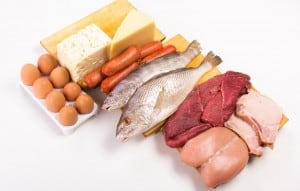 If you’re aiming to lose weight, we suspect there’s a good chance that you want to build and tone your muscle and even if we’re wrong on that one, we’re pretty sure that you want to avoid hunger pangs. Protein has long been recognized as a muscle-building food and more recently people have become aware of the role it plays in making us feel full and hence more able to resist unhealthy snacking.
If you’re aiming to lose weight, we suspect there’s a good chance that you want to build and tone your muscle and even if we’re wrong on that one, we’re pretty sure that you want to avoid hunger pangs. Protein has long been recognized as a muscle-building food and more recently people have become aware of the role it plays in making us feel full and hence more able to resist unhealthy snacking.
Oily fish
Even though you generally want to be careful with fat when you’re working on weight loss (and indeed afterwards), you do still usually need some element of fat in your diet and oily fish is a great way to get it because it’s a high-quality source of protein and also rich in omega-3 acids as well as vitamins and minerals.
Lean red meat and white meat
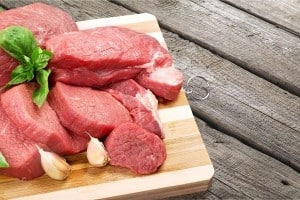 Red meat is one of those food types which has long attracted mixed reviews in terms of health, so let’s cut through the hype and get to the facts. Red meat is high in protein and contains vitamins and minerals, especially iron. It can also be high in fat. The impact the fat content has on you depends largely on what kind of lifestyle you lead, i.e. are you using it as fuel and burning it off in some way or is your body storing it as fat deposits.
Red meat is one of those food types which has long attracted mixed reviews in terms of health, so let’s cut through the hype and get to the facts. Red meat is high in protein and contains vitamins and minerals, especially iron. It can also be high in fat. The impact the fat content has on you depends largely on what kind of lifestyle you lead, i.e. are you using it as fuel and burning it off in some way or is your body storing it as fat deposits.
Given that you’re reading an article about the top 20 foods to boost your weight loss, we’re guessing that at this point in time you’re in the latter category. That being so, for the time being, we suggest you stick to lean red meat and white meat and, of course, cook it in a healthy way, e.g. grilling, steaming and stewing rather than roasting and frying. Again, think about how you dress your meat too, stay away from cream and butter sauces, in fact ask yourself if your meat actually needs any dressing at all.
Beans and legumes (peas, peanuts and lentils)
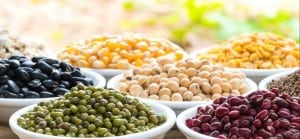 Although beans and legumes contain a lot of fibre, the main reason they’re prized is because they are an affordable and nutritious source of protein. For the most part, they are also low in fat. Like meat, they are rich in vitamins and minerals, particularly B vitamins, calcium, potassium, phosphorous and zinc. Beans are also an excellent source of iron, legumes do contain iron but at a lower level.
Although beans and legumes contain a lot of fibre, the main reason they’re prized is because they are an affordable and nutritious source of protein. For the most part, they are also low in fat. Like meat, they are rich in vitamins and minerals, particularly B vitamins, calcium, potassium, phosphorous and zinc. Beans are also an excellent source of iron, legumes do contain iron but at a lower level.
Just for the record peanuts are actually legumes rather than nuts, which is why they’re in this section, even though they taste and are generally treated like genuine nuts.
Nuts
When we say nuts, can we please emphasize we’re talking about nuts in their natural form rather than after having been roasted and/or covered in salt or another dressing? Nuts are packed full of protein and while they’re generally more expensive than beans and legumes, they are generally a whole lot cheaper than good-quality meat and hence can be a very affordable source of protein. They also have plenty of fibre and omega-3 fatty acids.
Whole eggs
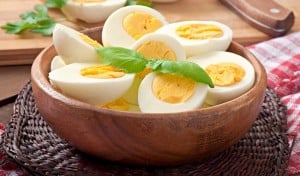 Eggs are another food which has had mixed reviews, some hail it as a wonder food, others point to the cholesterol content. We’re very firmly in the former camp. In addition to the protein they contain, eggs are full of vitamins and minerals and what’s more they contain the specific vitamin B12.
Eggs are another food which has had mixed reviews, some hail it as a wonder food, others point to the cholesterol content. We’re very firmly in the former camp. In addition to the protein they contain, eggs are full of vitamins and minerals and what’s more they contain the specific vitamin B12.
B12 is an extraordinary vitamin in many ways, one of which being that it is the only vitamin which is only found in meat and dairy produce, it cannot be absorbed through a purely plant-based (vegan) diet. It is also an essential vitamin, deficiency in which can have serious negative consequences.
Anyone who is thinking about eliminating meat from their diet will need to ensure that they get enough dairy food and/or eggs to get the B12 they need. Anyone who wants to eliminate both meat and dairy from their diet will either need to make sure to eat eggs or take a B12 supplement.
B12 supplements are made from bacteria and are therefore suitable for strict vegans (assuming you avoid the ones with gelatine added). Having said that, chicken’s eggs are unfertilized, healthy, tasty and affordable so it may be worth considering them even if they are not, technically, vegan. In terms of fat, about a quarter of the fat in eggs is saturated fat, which is linked with the production of cholesterol, however much of the fear some people still feel about cholesterol is based on questionable research which suggested a link between cholesterol and heart disease.
These days even the British Heart Foundation advises that it is safe to eat eggs as part of a healthy diet. As always, while eggs themselves are healthy, their benefits can be spoiled through unhealthy cooking, so stick with options such as boiling, poaching and scrambling rather than frying.
Cottage cheese
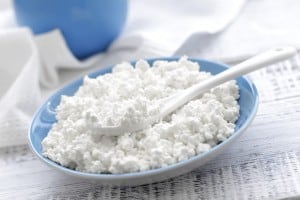 Those of a certain age may remember cottage cheese as being a popular diet food in the 1980s. Well, the hype may have stopped but the weight-loss benefits are still very real.
Those of a certain age may remember cottage cheese as being a popular diet food in the 1980s. Well, the hype may have stopped but the weight-loss benefits are still very real.
It’s packed full of protein but is very low in carbohydrates and fat. This is the big point of contrast between cottage cheese and other dairy products, which also have a lot of protein but can be very high in fat. Cottage cheese is also rich in vitamins and minerals, including, of course, calcium.
From a practical perspective, cottage cheese has a very mild taste, which means that most people can, at least, eat it without finding it unpleasant and it also means that it can be “livened-up” by adding other foods, pineapple being the traditional 1980s classic. It can also be used for sandwiches (drain it first) and as a filling for baked potatoes, in fact cottage cheese works well with potatoes in general, try making mash using cottage cheese instead of butter. It’s also a good side dish with many main courses.
Full-fat yoghurt
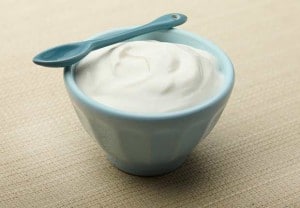 The inclusion of yoghurt is unlikely to surprise anyone, it’s made of milk and therefore has lots of protein along with vitamins and minerals, especially calcium. Probiotic yoghurt has the added benefit of helpful bacteria to help keep your digestive system in good order. We suspect, however, that the full-fat bit might have caught a few people by surprise. Here’s what you need to know about science to understand it.
The inclusion of yoghurt is unlikely to surprise anyone, it’s made of milk and therefore has lots of protein along with vitamins and minerals, especially calcium. Probiotic yoghurt has the added benefit of helpful bacteria to help keep your digestive system in good order. We suspect, however, that the full-fat bit might have caught a few people by surprise. Here’s what you need to know about science to understand it.
Fat itself actually plays a really important role in the health of the body. In addition to making us feel full, it slows down the absorption of food, particularly sugars, such as the ones found in milk. The most obvious benefit of this is that fat can actually help to keep hunger pangs at bay meaning that you actually consume fewer calories overall.
Another benefit, which may be less obvious, is that fat stabilizes our sugar levels, helping us to avoid both sugar rushes and the sugar lows which can send us frantically in search of unhealthy sweet foods. Full-fat dairy foods are also lower in lactose than their reduced-fat counterparts, which mean that those with impaired lactose tolerance may find them easier to digest.
The final reason to eat full-fat yoghurt is that reduced-fat products generally have to compensate for the lack of fat in some way, such as adding extra sweeteners.
Fibre, vitamins and minerals
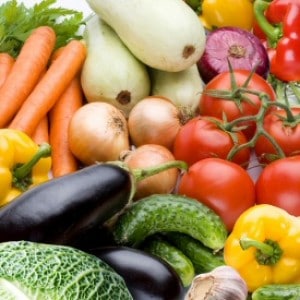 You probably don’t need us to tell you that fruit and vegetables are great for people who want to boost their weight loss. You may need us to explain why you should eat whole fruits and vegetables (as opposed to drinking fruit and vegetable juice) and to highlight which particular fruits and vegetables are best for you.
You probably don’t need us to tell you that fruit and vegetables are great for people who want to boost their weight loss. You may need us to explain why you should eat whole fruits and vegetables (as opposed to drinking fruit and vegetable juice) and to highlight which particular fruits and vegetables are best for you.
The reason you should eat whole fruits and vegetables is because they are full of fibre, which helps to make you feel full and counterbalances the impact of the fruit sugars. When you juice a piece of fruit or a vegetable, you lose the fibre but keep the sugar. Admittedly you also keep the vitamins and minerals so fruit juices are far from the unhealthiest drinks out there (that title probably goes to energy drinks), but still they are rather less healthy than a lot of people seem to believe (and the marketing suggests).
So here are our top picks of the best fruits and vegetables to boost your weight loss.
Leafy greens
Leafy greens such as lettuce, cabbage and spinach are great for weight loss since they provide lots of filling fibre with practically no calories and a whole gamut of vitamins and minerals. In particular, they are a useful source of vitamin K, which plays an important role in the production of the protein osteocalcin (nothing to do with the mineral calcium) and is critical to good bone health. If you’re looking to lose weight, you’re probably increasing your activity levels as well as reviewing your diet and so it’s important to do everything you can to take care of your bones.
Cruciferous vegetable
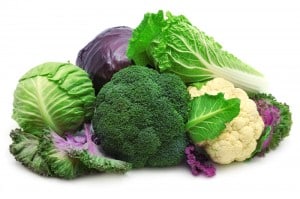 Cruciferous vegetables are just members of the cabbage family, for example cabbage itself, Brussels sprouts, broccoli, cauliflower, kale and radishes. They’re full of fibre and packed with vitamins and minerals. We are aware that for some people, cabbage and anything to do with it can have bad associations, but this is generally to do with how it is prepared rather than the vegetable itself.
Cruciferous vegetables are just members of the cabbage family, for example cabbage itself, Brussels sprouts, broccoli, cauliflower, kale and radishes. They’re full of fibre and packed with vitamins and minerals. We are aware that for some people, cabbage and anything to do with it can have bad associations, but this is generally to do with how it is prepared rather than the vegetable itself.
Cabbage doesn’t have to be boiled at all and it certainly doesn’t have to be boiled to a soggy mess, it can be served raw or lightly steamed or added to stir fries. Similar comments apply to its relatives.
Bananas
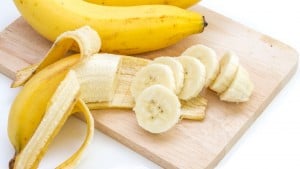 As far back as the 1960s, some sports people were already clued up on the benefits of bananas. Tennis players Ken Rosewall and John McEnroe both incorporated them in their diet, with Rosewall eating them during matches. They remained, however, something of a niche food item until 1982 when rising tennis star Martina Navratilova found herself struggling with her form and turned to sports nutritionist Robert Haas for help.
As far back as the 1960s, some sports people were already clued up on the benefits of bananas. Tennis players Ken Rosewall and John McEnroe both incorporated them in their diet, with Rosewall eating them during matches. They remained, however, something of a niche food item until 1982 when rising tennis star Martina Navratilova found herself struggling with her form and turned to sports nutritionist Robert Haas for help.
Haas put Navratilova on a diet of minimal fat and lots of carbohydrate in the form of pasta and bananas and Navratilova then went on to win 102 of her following 104 matches. A few years later, TV cameras picked up tennis star Boris Becker eating bananas during the breaks between games and from that point bananas started to be taken seriously as a superfood for everyone, particularly people taking a lot of exercise.
In terms of sports, their most obvious attraction is that they are a great source of complex carbohydrate, while being low in fibre and fat, which means that they are literally light on the stomach, meaning that they can be enjoyed during exercise without the eater feeling weighted down. Their high content of vitamins and minerals is always helpful and the fact that they are rich in potassium is a particular benefit since potassium helps to enhance muscle strength. In short, if you want an easy way to give yourself an energy boost without resorting to refined sugars, then bananas are an excellent choice.
Grapefruit
Grapefruit has long been known as a “slimmer’s fruit” to the point where some diet gurus try to attribute it with “scientifically-proven fat-burning properties”. Grapefruit doesn’t burn fat, only activity does that. Grapefruit does, however, fill you up (due to the fibre content) and also provides potassium, lycopene, vitamin C and choline (a micronutrient, nothing to do with chlorine) and antioxidants. Its nutritional content means that it is very beneficial to the heart and the circulatory system.
Avocados
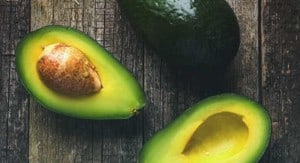 Avocados are high in both fibre and fat, but most of the fat in question is oleic acid, which is also the fat found in olive oil. As previously mentioned fibre and fat both help to make you feel full, hence encouraging you to eat less overall. Avocados are also loaded with vitamins and minerals, including potassium.
Avocados are high in both fibre and fat, but most of the fat in question is oleic acid, which is also the fat found in olive oil. As previously mentioned fibre and fat both help to make you feel full, hence encouraging you to eat less overall. Avocados are also loaded with vitamins and minerals, including potassium.
Tip: The way to cut an avocado in half safely (i.e. without cutting yourself as well) is to insert the knife and then keep the knife still while you turn the avocado. Then, when you have made an incision all the way around, remove the knife and twist the avocado to separate the two halves. Use a spoon to remove the pit (much easier than a knife).
If you have your heart set on avocado fans using the full half avocado, we’d suggest taking the skin off with a peeler rather than a knife, otherwise, we’d recommend that you cut up the avocado first and then remove the peel. We’d still use a peeler but at this point a knife should be fine.
Soups
Like grapefruit, soups have long been associated with weight loss and there is a very good reason for this. Soups keep all the goodness of their ingredients, including the fibre which is lost during the juicing process and the addition of water provides appetite-satisfying bulk without calories.
Most of the content of soup tends to be vegetables, but you can add protein with meat (or cheese) and carbohydrates with starchy foods such as potatoes and pasta or grains or by eating bread with your soup.
Small wins
These foods are unlikely to form a key part of your diet, but if you find you like them (or can at least live with them), they may still help.
Spirulina
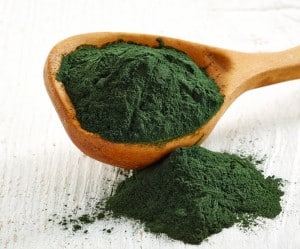 Spirulina is a form of algae and is widely prized for its numerous health benefits. In terms of weight loss probably its most important property is the fact that it’s full of protein, which helps to make you feel full. If you’re feeling less than thrilled about the idea of getting any of your protein from algae, then have a read through of the nutritional content in spirulina and you may find yourself convinced.
Spirulina is a form of algae and is widely prized for its numerous health benefits. In terms of weight loss probably its most important property is the fact that it’s full of protein, which helps to make you feel full. If you’re feeling less than thrilled about the idea of getting any of your protein from algae, then have a read through of the nutritional content in spirulina and you may find yourself convinced.
Apple cider vinegar
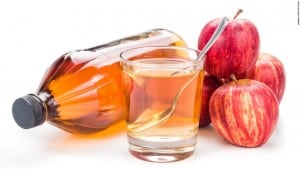 Apples have sugar; fermentation turns sugar into alcohol (cider) and bacteria then turn this into acid, specifically acetic acid giving us apple cider vinegar. Vinegar has been used medicinally since ancient times, Hippocrates (the father of medicine) used it to treat wounds and given that vinegar is an acid and is known to be effective as a cleaner, this probably came under the category of “it hurts but it works”.
Apples have sugar; fermentation turns sugar into alcohol (cider) and bacteria then turn this into acid, specifically acetic acid giving us apple cider vinegar. Vinegar has been used medicinally since ancient times, Hippocrates (the father of medicine) used it to treat wounds and given that vinegar is an acid and is known to be effective as a cleaner, this probably came under the category of “it hurts but it works”.
More recently, a study by Japanese scientists suggested that apple cider vinegar might help to reduce obesity. This may be because apple cider vinegar slows the rate at which food and liquids exit the stomach so diabetics should speak to their doctor before using apple cider vinegar as they may find it makes it a challenge to monitor and hence control their blood-sugar levels.
The other key point about apple cider vinegar is that it is an acid and hence needs to be handled with care, we’d strongly advise against drinking it neat. What we would say is that if you like vinegar and want to use it as a condiment, then think about trying apple cider vinegar.
Chilli pepper
Hot food makes you sweat and that sweat takes energy to produce, hence the fact that chilli pepper can assist with weight loss. Again, we’d put this one under the category of “if you like it anyway”…
Chia seeds
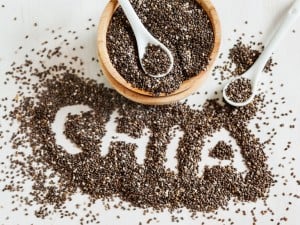 Chia seeds are high in both fibre and protein, which makes them a great, portable snack for when you need to fill up on the go. Of course, there are plenty of other options, such as nuts, which have their own benefits.
Chia seeds are high in both fibre and protein, which makes them a great, portable snack for when you need to fill up on the go. Of course, there are plenty of other options, such as nuts, which have their own benefits.
The reason we’ve singled out chia seeds is that they are a known source of omega-3 fatty acids as well.
Coconut Oil
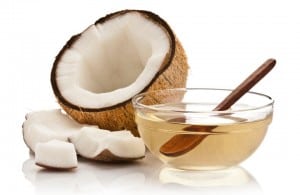 Although coconut oil is probably more widely valued as a beauty product than a health product, it does still have benefits as a foodstuff. Basically, even though coconut oil is high in saturated fat, this saturated fat is mostly medium-chain triglycerides, which the body processes differently to the longer-chain fats found in most vegetable oils, dairy foods and meats.
Although coconut oil is probably more widely valued as a beauty product than a health product, it does still have benefits as a foodstuff. Basically, even though coconut oil is high in saturated fat, this saturated fat is mostly medium-chain triglycerides, which the body processes differently to the longer-chain fats found in most vegetable oils, dairy foods and meats.
In short, the body burns them off more easily, which is just what you want when you are on a weight-loss programme but still need to incorporate fat into your diet. The key point to remember, however, is that you still need to keep your fat intake under control.
Fitness fanatic and always on the move. Carly is a certified personal trainer and currently teaches spin class, Zumba, and Body Pump amongst a few others. Carly has a PhD/MSc in Sport and Exercise Nutrition so she really knows her stuff and has worked in fitness and health all her life. We are honoured to have her as a member of the team. Carly has an infectious laugh, loves terrible, terrible jokes and her dog Trevor and often works with a local mental health charity













